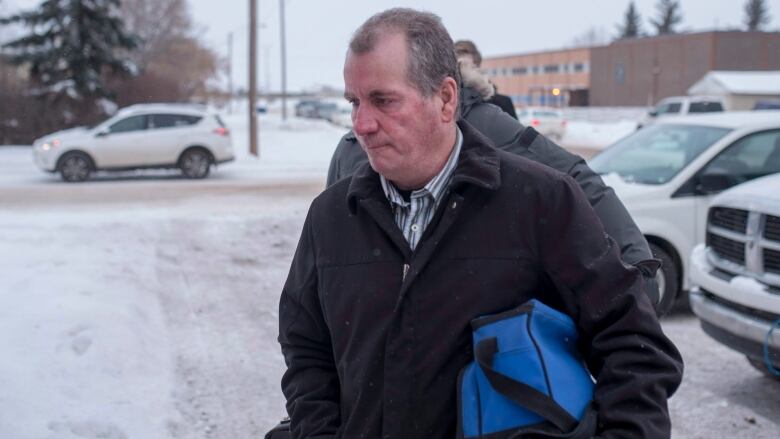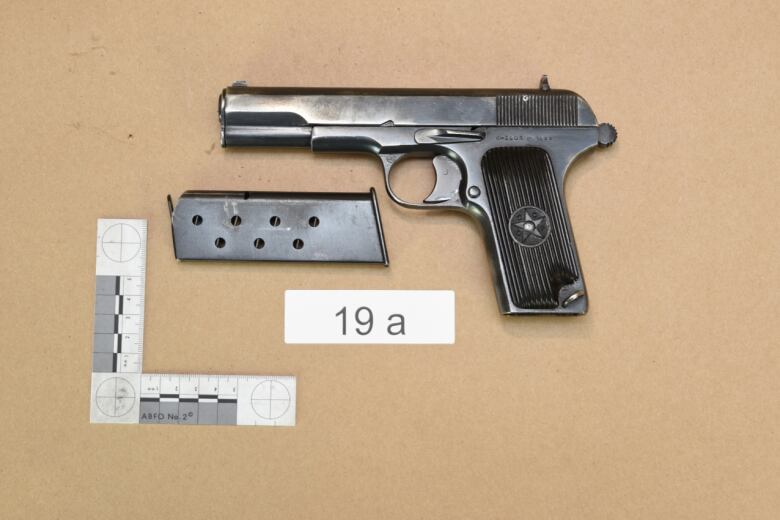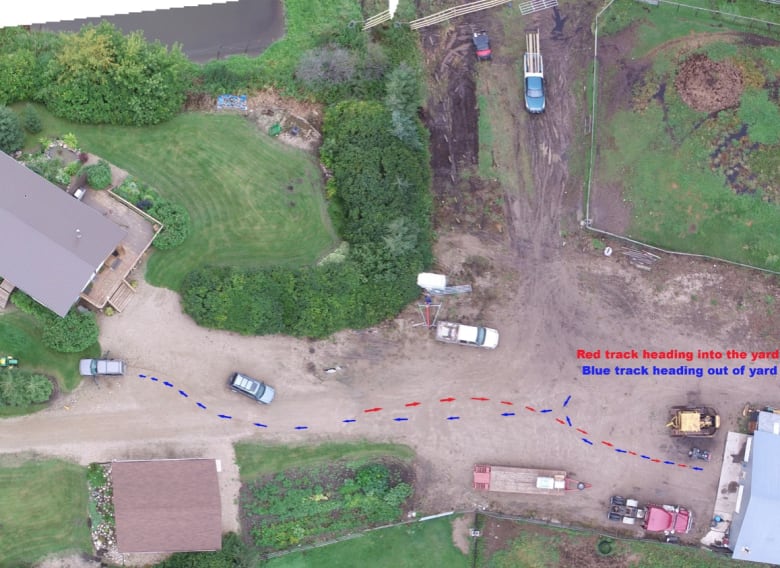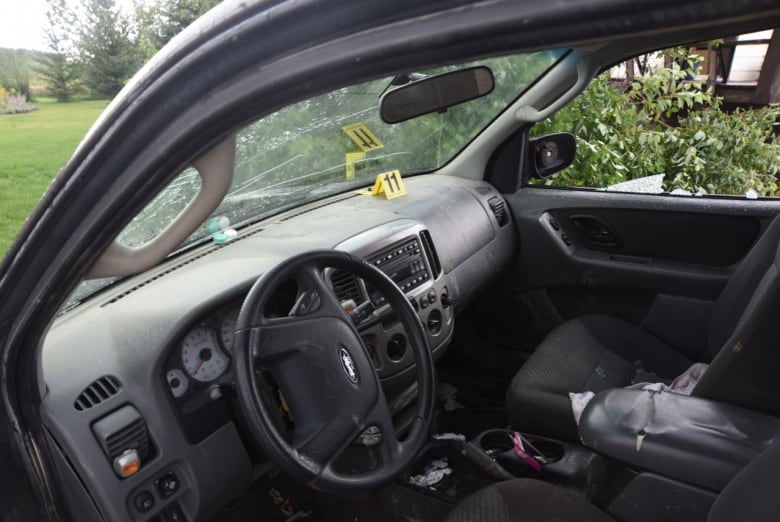Gerald Stanley's defence of a hang fire 'accident' key to jury decision
Stanley testified in own defence that gun went off accidentally, killing Colten Boushie

By definition, a pure accident should rarely attract criminal consequences, but inthe high-profile trial of Gerald Stanley, the accused told a jury this weekthat he didn't mean to shoot Colten Boushie.
"Boom, the thing just went off," Stanley testified Monday afternoon during his second-degree murder trial at the Court of Queen's Bench in Battleford, Sask. Boushie, 22, from Red Pheasant Cree Nation, was fatally shot on Stanley's Biggar, Sask.-area farm in August2016. Stanley has pleaded not guilty.
In the witness box, Stanley admitted to firing at least two shots on his farmyard to scare off people who had driven onto his property. He said by the time he walked up to the SUVcarrying Boushie, he thought his handgun was out of bullets and that it went off accidentally. He said he did not pull the trigger.
Defence lawyer Scott Spencer argued the fatal shooting was a "freak accident." He said Stanley was firing warning shots, but that the third one was something known as "hang fire,"in which a firearm will delay firing of a bullet.
Before the jury began deliberating on Thursday afternoon, Justice MartelPopescul'sprovided them with a sheet of possible verdicts in no particular order: not guilty, guilty of manslaughter or guilty of second-degree murder.

While many expected this case would turn exclusively on property rights and issues surrounding self-defence, the defence of an "accident" although uncommon could lead to an outright acquittal for Stanley, or a conviction of manslaughter.
In raising the defence of accident, it is important to remember that the accused does not have to prove that the death of Boushie was accidental. It's up to Crownto satisfy the jury beyond a reasonable doubt that his death was not an accident.
Simple equation
Criminal liability can generally be stated in an overly simplified equation as: act + intention - defence = guilt.
Although I refer to the defence of "accident" as a "defence" it really refers to an "unintended act" or an "unintended consequences" of an unintended act.
The "defence of accident" also varies depending on the nature of the offence. Popescul said the jury must decide, if they believe Stanley did not pull the trigger, if it was careless handling or lawful. He said the Criminal Code pays "special attention" to firearms because of their unique ability to cause serious injury and death.
1993 Sutherland decision
One of the more thorough decisions on the question of jury instructions with respect to the defence of accident was given by Justice WilliamVancise of the Saskatchewan Court of Appeal in the 1993 Sutherland decision. In Sutherland, the accused forced his girlfriend, at gunpoint, to accompany him to his car.
The accused testified that as he turned to place the rifle in the car, it accidentally discharged, killing his girlfriend. He panicked and fled the scene. A jury convicted him of murder. He conceded that he was at least guilty of manslaughter.
There was expert evidence in support of his plea of accidental shooting to the effect that the bullet ricocheted off the gravel parking lot and killed his girlfriend. The appeal centred around the instructions to the jury on the defence of accident, which will be just as important in the Stanley case.

Burden of proof on Crown
Vancise, speaking for the majority, held that the defence of accident is inextricably linked to the issue of intent.
In his opinion, the jury should have been instructed that if the defence of accident left the jury in a state of reasonable doubt, they had to find the appellant not guilty of the murder. He said that the trial judge should have instructed the jury to the effect that: There is evidence before you that raises the defence of accident.
The accused does not have to prove that his conduct was accidental. The burden of proof is on the Crown to prove beyond a reasonable doubt that the defence of accident cannot succeed.
a. If you accept the evidence in support of the defence of accident, thenyou must render a verdict of guilty of the included offence of manslaughter.
b. If you do not accept the evidence in support of the defence of accident, but you are left in a reasonable doubt by it, thenyou must also return a verdict of guilty of the included offence of manslaughter.
c. Even if you are not left in a reasonable doubt by the evidence in support of the defence of accident, you must still go on to determine whether or not, on the basis of all the evidence, the accused is guilty of the offence charged.
Although factually different than the Stanley case, in that Sutherland, unlike Stanley, admitted that he was at minimum committing an unlawful act, the Sutherland case highlights that once the accused establishes there is an "air of reality" to the defence, the Crown must disprove the availability of the defence beyond a reasonable doubt.
The "air of reality" test is one that is often referred to in criminal trials.
The test basically means that, before the jury can even consider a potential defence, the defence must be more than an outlandish suggestion being put to the jury. The test applies a very low threshold and requires that there must be just "some evidence" upon which a jury could acquit.

Was this an accident?
For an act to be attributed to the responsibility of a person in the criminal law it must be voluntary. A voluntary act is the expression of a conscious choice and conscious control by the person who commits it. Accidents are, by definition, not voluntary.
Although much attention has focused on the issue of "hang-fire," a finding of accident by the jury will not entirely end the matter. The circumstances and the conduct of Stanley and the alleged trespassers will also need to be considered.

In the 1985 Barron case, the Ontario Court of appeal dealt with the defence of accident argument.
The court found that even when an accident has occurred, where the accused's conduct constituted such a marked departure from the standard expected of a reasonable person acting in similar circumstances, then an accused can still be convicted of criminal negligence even though the victim's death or bodily harm was accidental.
Therefore, notwithstanding a finding that the hang-fire defence has raised a reasonable doubt as to the act and intention part of the equation, in order to return a verdict of not guilty on all possible charges, the jury must still ask: Were the accused's actions leading up to the shooting reasonable?
If there is a reasonable doubt that the shooting was an accident and the accused was not engaged in an unlawful act, or criminal negligence, and did not knowthe act was likely to cause Boushie's death, then he has a complete defence of accident to the charge, whether it be murder or manslaughter.
While many opinions exist on the defence of accident being raised during the Stanley murder trial, the opinion of the jury will be the only opinion that truly matters on whether the Crown has proven the accused guilty of anything, beyond a reasonable doubt.












_(720p).jpg)


 OFFICIAL HD MUSIC VIDEO.jpg)
.jpg)



























































































